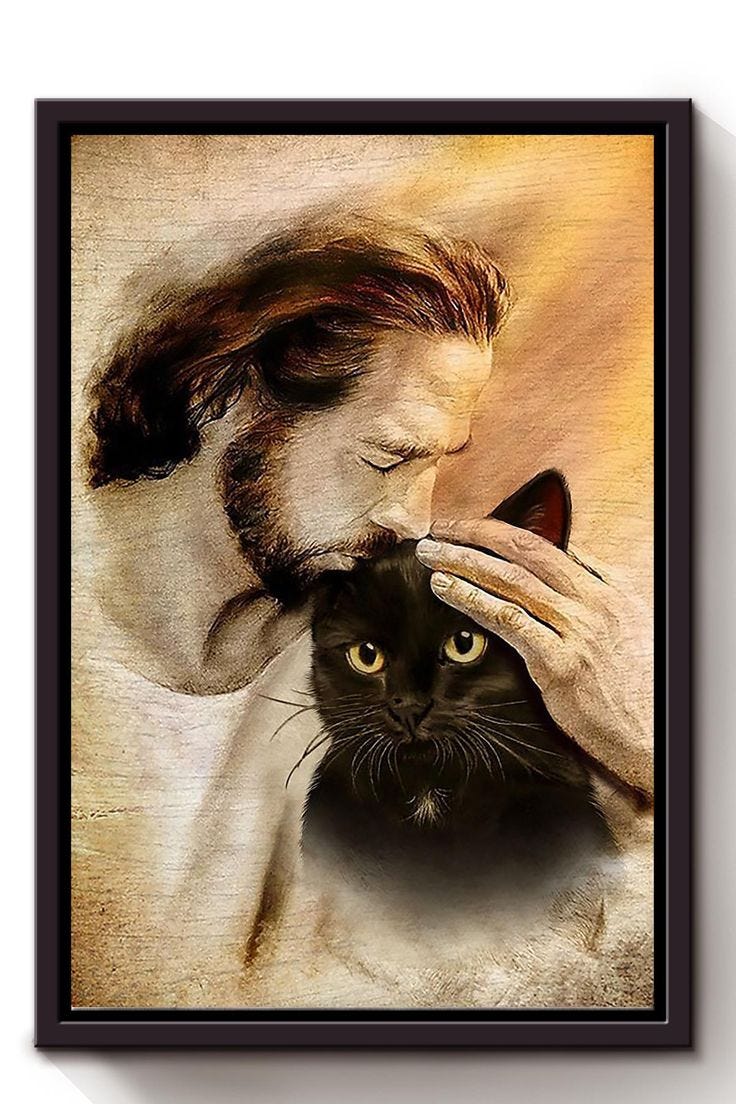(TW: rape, incest)
2022 was the hardest year of my life. In the first half of the year I lost my dad. I decided to permanently separate from my mom and siblings. I had two grifters living with me who were draining my resources. I was heavily involved with a small group of skate girls who actively “Mean Girl’d” me and I had to separate from them as well. The whole first half of the year was one giant mind fuck, and the second half of the year was trying to survive from the fallout.
In early 2023, almost a year to the day that he arrived, I lost my cat Lenny whom I had named after my dad. He had showed up in my yard when I returned from my dad’s funeral and wouldn’t leave, so I took him in and cared for him, even as his health declined rapidly later in the year. I ended up spending thousands of dollars and countless hours trying to keep him alive, shedding tears over his worn out little body as I tried to get him to eat or take medicine. I didn’t think that God would send me this little guy and then take him away from me so quickly, but eventually it was cruel to keep him alive when he was in so much pain. I think that Cat Lenny was a way to grieve for my father, whom I had not gotten to see or take care of when he died. Caring for Cat Lenny gave me the opportunity to give all of the love and compassion to someone that I wished I could have given to my father as he was dying.
When Cat Lenny died, it was a huge relief. I didn’t want my little guy to suffer anymore but I couldn’t make the decision to have him put down. As soon as I took care of his arrangements, I went to the lake in my neighborhood to contemplate my next steps. I knew I wanted to travel now that I didn’t have to stay home with him, and I had been putting off a trip to see my friend in Maine for six months. I set up an idea to fly to Maine and work my way down the coast, staying with friends in NYC, DC, North Carolina, South Carolina, and finally Florida. I thought it would be fun to take trains all the way down the east coast and see the country that way.
This plan was derailed, however, when my friend’s mom who was in North Carolina, ended up going to California at the same time I was set to go to her house. I had been talking to some friends in Europe, and my old neighbor and good friend invited me to come stay with her in Austria for a few weeks. Then a friend in Copenhagen said I could stay at their apartment for a week, and so my East Coast plans because European plans. I flew to Maine and visited that friend, and took the train to New York and stayed with friends there before flying to Munich, where my friends picked me up to drive us to Salsburg. I had never been to Austria before and it’s a beautiful country, especially where my friends live in the Austrian Alps, the exact setting for the Sound of Music.
Part of the reason for this big trip was to reconnect with old friends I hadn’t seen since the pandemic. Since disconnecting from my birth family, I wanted to remind myself of all the people I had in my life that had chosen to love me over time and distance. My friend I visited in Maine I have known since highschool. My friend in NYC I’ve known for over 20 years. My friend in Austria I’ve known for over ten years. I have so many people in my life that I could call my “chosen family” and I wanted to reconnect with them after being orphaned by the people I was related to by blood.
I also wanted to share with them what I had gone through in the past year. I had written a book as I was going through intense therapy over the summer of 2022 and I wanted to let my friends know about it before ever going public with my stories. I wanted to know I still had their support and love as I came out about the abuse I had experienced. I had grown up in a family where love was conditional and transactional. I needed to be reminded of what it meant to be loved for who I am rather than what I could provide.
When I was in Austria, I told my friend a brief version of how I had separated from my mother because of how she treated me, and that it wasn’t safe for me to have my mother in my life. My friend’s immediate response was to see things from my mother’s point of view, to think about what my mom must have gone through to then treat her own daughter badly. We had a few repeat discussions like this and I didn’t open up further about what exactly my mom had done to me.
When I was in London the following week, I met with a friend. Everyone always asked while I was traveling and I usually told a version of how I had had a rough year and needed a break to recover. Sometimes my family stuff would come up, often it would not. At one dinner I had with a friend, I mentioned that I had separated from my family, and she immediately went into talking about forgiveness. This woman is a Christian and I understand that forgiveness is a big theme in Christianity. I also understand that most people are not equipped to casually hear about or deal with the amount of trauma I have been through, and so I try to share as little as possible with people unless they are very close friends. Which means that they are giving this “forgiveness” advice based on a lack of knowledge and ability. So I am not upset when people jump to forgiveness as soon as they hear about some sort of falling out or grievance.
But I do think that the gospel of forgiveness can be a toxic element that allows abusive situations to continue.
I spent many years in a yoga community in Los Angeles. I also grew up in a Catholic family and became a Born-Again Christian in my teen years. In both the yoga and Christian communities, there is an immediate jumping into Forgiveness in any situation. I often hear, and have said, that “Forgiveness is for you, not for the person who has wronged you.” And I have experienced that, I have had to forgive people in the past so I could let go of thinking about them. But lately I am thinking about how jumping straight to forgiveness skips over the real work of examining what it is that needs to be forgiven.
I think that forgiveness is often a bandaid painted over real harm. It can be a way to skip over the painful part of trauma healing and go straight into pretending that everything is ok.
But the thing about trauma is that it hurts you whether you acknowledge it or not. Pretending something is ok - for example, practicing forced forgiveness - often manifests itself in other areas of your life. Sometimes unhealed trauma comes out in health problems - stress can cause heart and weight issues. My therapist once told me that all addictions come from childhood trauma. Ignoring hidden pain by forcing forgiveness means that pain is still living in your subconscious and when it tries to come up, the addictive ego forces the pain or memories down by drowning them in obsessive working, alcohol, overeating, gambling, sex, or other behaviors meant to run away from pain engagement.
In America, we live in a culture where we have been taught that we can do anything as long as we put our mind to it. The American Dream is to make something of ourselves, to pull ourselves up by our bootstraps to become better than our parents. This has resulted in a sort of pathological positivity where we think that if we just stay positive, we can achieve our dreams. Holding onto grudges, or even acknowledging that there is something to hold a grudge about, is antithetical to the Positive American Mindset, and so we are swingled into fast-forwarding our forgiveness. We are a fast-food culture. Working on finding the root cause of our pain is a long process. We want that part to be over with, so we take the drive-through option instead of sitting down for the full three hour meal.
There are things in this world that should not be forgiven. This is a relatively new way of thinking for me, as I grew up in the afore-mentioned Christian and then yogic cultures. I thought forgiveness meant rising to a higher spiritual level: “To err is human, to forgive Divine” etc etc etc. The Bible speaks repeatedly about forgiveness, and somehow that has become more important than what else the Bible reiterates: treating each other well.
There are things in this world that do not need to be forgiven. One time my therapist casually threw out “You don’t need to forgive.”
I was so confused. “I don’t?”
“No,” she said. “You heal and you move on. You don’t need to forgive.”
This was a revelation. This felt freer than any forgiveness I had ever done. I did not have to forgive. I could heal and move on.
When I came forward to my extended family about having been abused by my uncle as a young child, another uncle messaged me on Facebook and said
“Forgiveness can be very healing.”
I was shocked. I had not heard from this particular uncle, who was my Godfather, since I had come out about the abuse. And here he was telling me to forgive. I wrote back.
“How many children has your brother raped while you were preaching forgiveness?”
“Sometimes you need to forgive many times.” Was his reply.
—-----------------------------------------------
There are things in this world that do not deserve to be forgiven. In my family, the teachings of Christ were used as a way for the abuse to continue. We were told that forgiveness was healing so we would continue to participate. We were not allowed to acknowledge that there was anything that we needed to be angry about.
I don’t talk to my mom anymore because she brought me to that monster’s house every spring break and every summer. She grew up in that family, she knew what it was. And she took me there.
There are things in this world that should not be forgiven.
I can acknowledge that my mom came from a history of abuse but I do not need to accept that it was ok for her to bring me into that world as well. Breaking free from that family means that I am free now to not continue to hurt people as I have been hurt. I do not need to forgive them. I do need to heal, and the only way I can do that is to be away from them.
This is how I have found my freedom: by recognizing the traps that lie in the gospel of forgiveness.










Yes exactly! I’m glad this resonated with you, Natalie ❤️
A very informative exploration here, Elizabeth. We risk cheapening forgiveness when we view it this way. Some people don't even acknowledge they did something wrong, let alone show remorse.
You don't need to forgive; you need to heal and move on. If you can do this without forgiving, then just do it. The talk of forgiveness is mostly by people who don't want accountability. They want the conversation to move on to other things.
You can always see where one is truly sorry. Here, you can forgive if they've proven they want to change. Otherwise, "Forgive me" becomes manipulation, and those asking for it are exactly the type that don't deserve it.